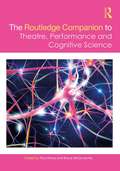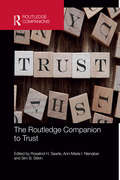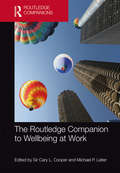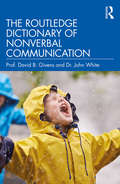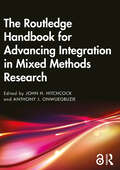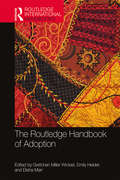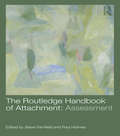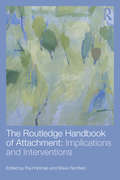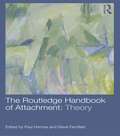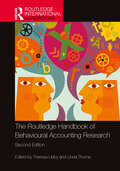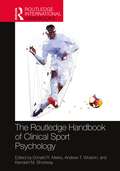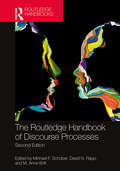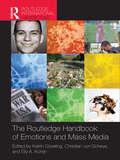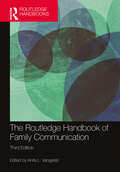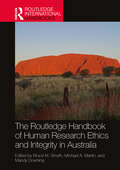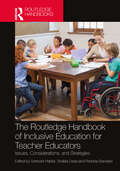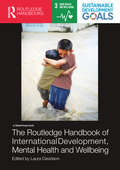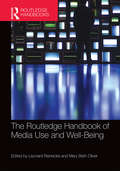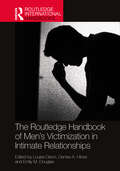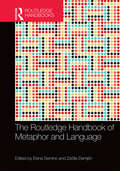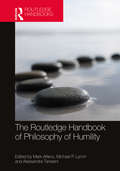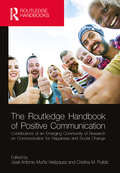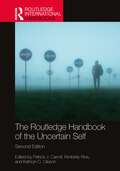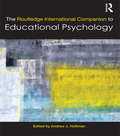- Table View
- List View
The Routledge Companion to Theatre, Performance and Cognitive Science (Routledge Companions)
by Bruce McConachie Rick KempThe Routledge Companion to Theatre, Performance and Cognitive Science integrates key findings from the cognitive sciences (cognitive psychology, neuroscience, evolutionary studies and relevant social sciences) with insights from theatre and performance studies. This rapidly expanding interdisciplinary field dynamically advances critical and theoretical knowledge, as well as driving innovation in practice. The anthology includes 30 specially commissioned chapters, many written by authors who have been at the cutting-edge of research and practice in the field over the last 15 years. These authors offer many empirical answers to four significant questions: How can performances in theatre, dance and other media achieve more emotional and social impact? How can we become more adept teachers and learners of performance both within and outside of classrooms? What can the cognitive sciences reveal about the nature of drama and human nature in general? How can knowledge transfer, from a synthesis of science and performance, assist professionals such as nurses, care-givers, therapists and emergency workers in their jobs? A wide-ranging and authoritative guide, The Routledge Companion to Theatre, Performance and Cognitive Science is an accessible tool for not only students, but practitioners and researchers in the arts and sciences as well.
The Routledge Companion to Trust (Routledge Companions in Business, Management and Accounting)
by Sim B. Sitkin Rosalind H. Searle Ann-Marie I. NienaberIn recent years, trust has enjoyed increasing interest from a wide range of parties, including organizations, policymakers, and the media. Perennially linked to turbulence and scandals, the damaging and rebuilding of trust is a contemporary concern affecting all areas of society. Comprising six thematic sections, The Routledge Companion to Trust provides a comprehensive survey of trust research. With contributions from international experts, this volume examines the major topics and emerging areas within the field, including essays on the foundations, levels and theories of trust. It also examines trust repair and explores trust in settings such as healthcare, finance, food supply chains, and the internet. The Routledge Companion to Trust is an extensive reference work which will be a vital resource to researchers and practitioners across the fields of management and organizational studies, behavioural economics, psychology, cultural anthropology, political science and sociology.
The Routledge Companion to Wellbeing at Work (Routledge Companions in Business and Management)
by Cary L. Cooper Michael P. LeiterOver recent years, many companies have developed an awareness of the importance of an active, rather than passive, approach to wellbeing at work. Whilst the value of this approach is widely accepted, turning theory into effective practice is still a challenge for many companies. The Routledge Companion to Wellbeing at Work is a comprehensive reference volume addressing every aspect of the topic. Split into five parts, it explores different models of wellbeing; personal qualities contributing to wellbeing; job insecurity and organizational wellbeing; workplace supports for wellbeing; and initiatives to enhance wellbeing. The international team of contributors provide a solid foundation to research and practice, including contemporary topics such as architecture, coaching, and fitness in the workplace. Edited by two of the world’s leading scholars on the subject, this text is a valuable tool for researchers, students, and practitioners in HRM and organizational psychology.
The Routledge Dictionary of Nonverbal Communication
by John White David B. GivensEvery day, the human awakes to a new world, a new dawn and a new cascade of nonverbal communication. It may be the pleasant scent of a rose, the soft touch of a loved one, the sight of sun rays on a bedroom floor or the excited chatter of a child. Whatever form it takes, your environment and all who inhabit it send nonverbal signals all day long – even while they sleep. The Routledge Dictionary of Nonverbal Communication celebrates this communication, examining a very wide selection of nonverbal behaviors, actions and signals to provide the reader with an informed insight on the world around them and its messages. Compiled in the form of a dictionary, the book is presented as a series of chapters with alphabetical entries, ranging from attractiveness to zeitgeist. The book aims to provide the reader with a clear understanding of some of the relevant discourse on particular topics while also making it practical and easy to read. It draws on a wide selection of discourse from fields such as neuroscience, psychology, anthropology and psychiatry. The dictionary will be an essential companion for anyone wishing to understand nonverbal communication. It will also be especially useful for those working in the field of nonverbal communication.
The Routledge Handbook for Advancing Integration in Mixed Methods Research
by Anthony J. Onwuegbuzie John H. HitchcockThis groundbreaking edited book, The Routledge Handbook for Advancing Integration in Mixed Methods Research, presents an array of different integration ideas, with contributions from scholars across the globe. This handbook represents the first major volume that comprehensively discusses this topic of integration. Perhaps the most fundamental and longstanding question in mixed methods research is: How does one best integrate disparate forms of information to produce the best form of inquiry? Each of the 34 seminal chapters in this handbook accelerates the discussion of integration across a broad range of disciplines, including education, arts-based analyses, and work in the Global South, as well as special topics such as psychometrics and media research. Many of the chapters present new topics that have never been written about before, and all chapters offer cutting-edge approaches to integration. They also offer different perspectives of integration – leading the introductory chapter to offer a new and comprehensive definition for integration, as follows: "referring to the optimal mixing, combining, blending, amalgamating, incorporating, joining, linking, merging, consolidating, or unifying of research approaches, methodologies, philosophies, methods, techniques, concepts, language, modes, disciplines, fields, and/or teams within a single study." The concluding chapter offers a meta-framework that accounts for this definition and is designed to help scholars think more about integration in a way that represents a continuous, dynamic, iterative, interactive, synergistic, and holistic meaning-making process. This handbook will be an essential reference work for all scholars and practitioners using or seeking to use mixed methods in their research.
The Routledge Handbook of Adoption (Routledge International Handbooks)
by Gretchen Wrobel Emily Helder Elisha MarrAdoption is practiced globally yielding a multidimensional area of study that cannot be characterized by a single movement or discipline. This handbook provides a central source of contemporary scholarship from a variety of disciplines with an international perspective and uses a multifaceted and interdisciplinary approach to ground adoption practices and activities in scientific research. Perspectives of birth/first parents, adoptive parents, and adopted persons are brought forth through a range of disciplinary and theoretical lenses. Beginning with background and context of adoption, including sociocultural and political contexts, the handbook then addresses the diversity of adoptive families in terms of family forms, attitudes about adoption, and characteristics of adopted children. Next, research examining the lived experience of adoption for birth parents, adoptive parents, and adopted individuals is presented. A variety of outcomes for internationally and domestically adopted children and adoptive families is then discussed and the handbook concludes by addressing the development, training, and implementation of adoption competent clinical practice. With cutting-edge research from top international scholars in a diversity of fields, The Routledge Handbook of Adoption should be considered essential reading for students, researchers, and practitioners across the fields of social work, sociology, psychology, medicine, family science, education, and demography.
The Routledge Handbook of Attachment: Assessment
by Paul Holmes Steve FarnfieldThe Routledge Handbook of Attachment: Assessment provides, in one volume, a detailed discussion of the formal measurement tools available to assess attachment across the age range, including with families. It contains comprehensive chapters on many attachment-based validated procedures for assessing parenting and evaluating risk, to enable professionals to decide what type of assessment is appropriate, who should conduct it and the usefulness of the results. The book provides a detailed account of assessment measures of attachment to enable practitioners at all levels (including academic research workers) to decide which assessment procedure will best meet their need. The chapters are written by those who developed these tools and by people closely associated with them, and advocate an evidence-based model of assessment to increase fairness and transparency for families. Providing a practical guide to the uses of attachment theory and research in professional practice with adults, children, parents and families, and a detailed account of all the current evidence-based tools that can be used in assessment, The Routledge Handbook of Attachment: Assessment is ideal for professionals and clinicians wishing to commission or undertake assessments of attachment, as well as academic research workers and students.
The Routledge Handbook of Attachment: Implications And Interventions
by Paul Holmes Steve FarnfieldThe Routledge Handbook of Attachment: Implications and Interventions offers an introduction to therapies produced as a result of the popularity of attachment studies. These therapies can be divided into two categories: those that are ‘attachment-based’, in that they use evidence-based attachment assessments in their development, or ‘attachment-informed’, in that the theories of attachment have been integrated into the practice of existing schools of therapy. The book reviews the field and provides a range of interventions for children, adults and parents, beginning with a detailed review of both evidence-base and evidence-informed interventions including individual psychotherapy, family therapy and parenting. The remaining chapters provide accounts, from the practitioner’s perspective, of interventions that address issues of attachment from the level of one-to-one therapy, family and social work to social interventions involving courts and Care Proceedings, illustrated with examples from day-to-day practice. Discussing how an understanding of formal assessments of attachment can be used to inform therapeutic, social and legal interventions to assist and protect children, The Routledge Handbook of Attachment: Implications and Interventions is an indispensable guide for clinical psychologists, psychiatrists and social workers working with children and families, clinicians in training and students.
The Routledge Handbook of Attachment: Theory
by Paul Holmes and Steve FarnfieldThe Routledge Handbook of Attachment: Theory provides a broadly based introduction to attachment theory and associated areas, written in an accessible style by experts from around the world. The book covers the basic theories of attachment and discusses the similarities and differences of the two predominant schools of attachment theory. The book provides an overview of current developments in attachment theory, explaining why it is important not only to understanding infant and early child development but also to adult personality and the care we provide to our children. The Routledge Handbook of Attachment: Theory provides detailed descriptions of the leading schools of attachment theory as well as discussions of this potentially confusing and contentious area, and includes a chapter on the neuropsychological basis of attachment. The book also examines other domains and diagnoses that can be confused with issues of attachment and assesses contexts when different approaches may be more suitable. Providing a comprehensive yet accessible introduction to the theories of attachment, The Routledge Handbook of Attachment: Theory is an indispensable guide for professionals working with children and families in community and court-based settings, clinical psychologists, psychiatrists and social workers, clinicians in training and students.
The Routledge Handbook of Behavioural Accounting Research (Routledge International Handbooks)
by Theresa Libby Linda ThorneThe Routledge Handbook of Behavioural Accounting Research covers a full range of theoretical, methodological, and statistical approaches relied upon by behavioural accounting researchers, giving the reader a good grounding in both theoretical perspectives and practical applications. Behavioural research is broadly defined as research focused at the individual or small group level, drawing mainly on theories from psychology. It is well established in the social sciences and has flourished in the field of accounting in recent decades. This updated edition maintains the structure of the original handbook and includes all the original chapters which have been revised to reflect the current and evolving emphasis on the theories and tools employed in behavioural research and applied to the research in the accounting domain.In addition to the updated original chapters, eight new chapters have been included reflecting the expansion of the topics, theories, and methodologies and presenting developmental advice for behavioural accounting researchers. The new topic and theory chapters include chapters outlining our progress in research on the accounting for sustainability, language effects in financial disclosures, advances in policy-related research in financial accounting, the impact of algorithms and artificial intelligence, and the role of data analytics and data visualization on decision-making in accounting and auditing. Two additional method chapters include a primer on Hayes PROCESS models in mediation and moderation as well as a new chapter outlining best practices in the design and implementation of experiential questionnaires. Finally, a chapter has been added providing guidance and advice on responding to reviewers’ comments to complement the first-edition chapter on preparing a review.This book is a vital introduction for advanced doctoral students in behavioural accounting research as well as a valuable resource for established behavioural accounting researchers, providing a comprehensive guide to the development and implementation of a behavioural accounting research project.
The Routledge Handbook of Clinical Sport Psychology (Routledge International Handbooks)
by Donald R. Marks Andrew T. Wolanin Kendahl M. ShortwayClinical sport psychology is a rapidly growing field that brings together research and clinical interventions from both clinical psychology and sport and performance psychology. Complementary to sports medicine and clinical sport psychiatry, clinical sport psychology addresses the mental health needs and psychological well-being of athletes, coaches, and other members of the sport community. It offers scientifically informed conceptualizations of psychological distress as it manifests in sport settings, as well as empirically supported clinical interventions tailored to the needs of sport populations. This volume addresses the latest research findings regarding mental health among athletes and other sport professionals, including epidemiological research concerning depression, anxiety, eating disorders, and conduct and interpersonal problems. In addition, it explores the unique etiology of mental health problems among athletes, including psychological sequelae of injury and trauma, as well as concise practice guidelines for conceptualizing and treating psychological distress in sport populations. Strategies for thorough yet efficient psychological assessment of athletes, coaches, and other sport professionals are also provided. A compendium of relevant empirical research and clinical best practices for assessment and treatment, this handbook charts the course that clinical sport psychology has taken since its inception as a distinct clinical specialty and highlights future directions for this rapidly growing practice domain. It offers essential reading for psychologists and other mental health professionals who provide clinical services in sport and performance settings.
The Routledge Handbook of Discourse Processes: Second Edition (Routledge Handbooks in Linguistics)
by David N. Rapp M. Anne Britt Michael F. SchoberThe second edition of The Routledge Handbook of Discourse Processes provides a state-of-the-art overview of the field of discourse processes, highlighting the subject’s interdisciplinary foundations and bringing together established and emergent scholars to provide a dynamic roadmap of the evolution of the field. This new edition reflects several of the enormous changes in the world since the publication of the first edition—changes in modes of communication and an increased urgency to understand how people comprehend and trust information. The contents of this volume attempt to address fundamental questions about what we should now be thinking about reading, listening, talking, and writing. The chapters collected here represent a wide range of empirical methods currently available: lab or field experiments, with a range of measures, from quantitative to qualitative; observational studies, including classrooms or organizational communication; corpus analyses; conversation analysis; computational modeling; and linguistic analyses. The chapters also draw attention to the explosion of contextually rich and computationally intensive data analysis tools which have changed the research landscape, along with more contemporary measures of people’s discourse use, from eye-tracking to video analysis tools to brain scans. The Routledge Handbook of Discourse Processes, Second edition is the ideal resource for graduate students, researchers, and practitioners in a variety of disciplines, including discourse analysis, conversation analysis, cognitive psychology, and cognitive science.
The Routledge Handbook of Emotions and Mass Media
by Katrin DövelingThe impact of mass media on individuals and society is to a great extent based on human emotions. Emotions, in turn, are essential in understanding how media messages are processed as well as media’s impact on individual and social behavior and public social life. Adopting an interdisciplinary approach to the study of emotions within a mass media context, the Handbook of Emotions and Mass Media addresses areas such as evolutionary psychology, media entertainment, sociology, cultural studies, media psychology, political communication, persuasion, and new technology. Leading experts from across the globe explore cutting-edge research on issues including the evolutionary functions of mediated emotions, emotions and media entertainment , measurements of emotions within the context of mass media, media violence, fear-evoking media, politics and public emotions, features , forms and functions of emotions beyond the message, and provide the reader a glimpse into future generations of media technology. This compelling and authoritative Handbook is an essential reference tool for scholars and students of media, communication studies, media psychology, emotions, cultural studies, sociology, and other related disciplines.
The Routledge Handbook of Family Communication (ISSN)
by Anita L. VangelistiThis third edition again brings together interdisciplinary contributions to provide a comprehensive and multifaceted resource that reflects the breadth and depth of research on family communication and family relationships.Chapters continue to address theoretical and methodological issues influencing current conceptions of family and cover communication occurring in a variety of family forms and across social, cultural, and physical contexts.This third edition includes key updates, such as: The use and influence of social media and technology in families Parenting and communication in culturally and structurally diverse families Communication and physical health of family members Managing personal information about difficult topics in families The influence of the COVID-19 pandemic on family members This handbook is ideal for students and researchers interested in interpersonal and family communication, relationships, and family therapy within the disciplines of communication, social psychology, clinical psychology, sociology, and family studies.
The Routledge Handbook of Family Communication (Routledge Communication Series)
by Anita L. VangelistiThis third edition again brings together interdisciplinary contributions to provide a comprehensive and multifaceted resource that reflects the breadth and depth of research on family communication and family relationships. Chapters continue to address theoretical and methodological issues influencing current conceptions of family and cover communication occurring in a variety of family forms and across social, cultural, and physical contexts. This third edition includes key updates, such as: The use and influence of social media and technology in families Parenting and communication in culturally and structurally diverse families Communication and physical health of family members Managing personal information about difficult topics in families The influence of the COVID-19 pandemic on family members This handbook is ideal for students and researchers interested in interpersonal and family communication, relationships, and family therapy within the disciplines of communication, social psychology, clinical psychology, sociology, and family studies.
The Routledge Handbook of Human Research Ethics and Integrity in Australia (Routledge International Handbooks)
by Michael A. Martin Bruce M. Smyth Mandy DowningThe Routledge Handbook of Human Research Ethics and Integrity in Australia highlights why it is important to look at the subject of human research ethics and integrity within the Australian context, and what the Australian perspective can offer to all researchers in the social sciences and humanities globally.Australia has one of the world’s most rigorous ethics governance frameworks. This edited collection comprises 35 chapters, compiled with the aim of presenting human research ethics and integrity in a way that can be readily understood and applied by undergraduate and postgraduate students, early career and seasoned researchers, Human Research Ethics Committee members, and those who work in the administration of human research ethics. Chapters that focus on research ethics with Aboriginal and Torres Strait Islander people are likely to be of great interest to an international audience interested in Indigenous research ethics more broadly. This collection will act as a prism through which ethical ‘first principles’ can be seen afresh from the vista of contemporary Australian research ethics frameworks.The issues raised in this collection are likely to resonate beyond the Australian context and will speak to researchers and educators in a variety of settings who find themselves grappling with thorny ethical issues ranging from the rapid evolution of data security and privacy concerns to research about cultural heritage and ethical approaches to Indigenous cultural and intellectual property.
The Routledge Handbook of Inclusive Education for Teacher Educators: Issues, Considerations, and Strategies
by Santoshi Halder, Shakila Dada and Rashida BanerjeeThis handbook provides foundational, conceptual, and practical knowledge and understanding of inclusive education and special needs education. It highlights the need for preparing special educators and teachers for inclusive classrooms to effectively cater to the needs of students with diverse needs in various low-, middle-, and high-income countries globally. It demonstrates various evidence-based and practice-based strategies required to create classrooms inclusive of diverse learners. While tracing the historical trajectory of the foundational underpinnings, philosophical bases, and crucial issues associated with inclusive education, this book presents a future roadmap and pathways through case instances and in-depth discussions to share with educators how they can strengthen their bases and make learning more inclusive in their context. It also provides an overview of the different models of assessment and their applications in the analysis of children in inclusive classroom settings. Comprehensive, accessible, and nuanced, this handbook will be of immense interest and benefit to teachers, educators, special educators, students, scholars, and researchers in the areas of social inclusion, education, special needs education, educational psychology, technology for inclusion, disability studies, among other related disciplines. It will be extremely beneficial for academicians, teacher educators, special educators, and those interested in professional teacher training courses.
The Routledge Handbook of International Development, Mental Health and Wellbeing
by Laura DavidsonMental health has always been a low priority worldwide. Yet more than 650 million people are estimated to meet diagnostic criteria for common mental disorders such as depression and anxiety, with almost three-quarters of that burden in low- and middle-income countries. Nowhere in the world does mental health enjoy parity with physical health. Notwithstanding astonishing medical advancements in treatments for physical illnesses, mental disorder continues to have a startlingly high mortality rate. However, despite its widespread neglect, there is now an emerging international imperative to improve global mental health and wellbeing. The UN’s current international development agenda finalised at the end of 2015 contains 17 Sustainable Development Goals (SDGs), including SDG3, which seeks to ensure healthy lives and promote wellbeing for all at all ages. Although much broader in focus than the previous eight Millennium Development Goals (MDGs), the need for worldwide improvement in mental health has finally been recognised. This Handbook addresses the new UN agenda in the context of mental health and sustainable development, examining its implications for national and international policy-makers, decision-makers, researchers and funding agencies. Conceptual, evidence-based and practical discussions crossing a range of disciplines are presented from the world’s leading mental health experts. Together, they explore why a commitment to investing in mental health for the fulfilment of SDG3 ought to be an absolute global priority.
The Routledge Handbook of Media Use and Well-Being: International Perspectives on Theory and Research on Positive Media Effects
by Mary Beth Oliver Leonard ReineckeThe Routledge Handbook of Media Use and Well-Being serves as the first international review of the current state of this fast-developing area of research. The volume provides a multifaceted perspective on the beneficial as well as the detrimental effects of media exposure on psychological health and well-being. As a "first-mover," it will define the field of media use and well-being and provide an essential resource for research and teaching in this area. The volume is structured along four central considerations: Processes presents concepts that provide a theoretical bridge between media use and well-being, such as psychological need satisfaction, recovery from stress and strain, self-presentation and self-enhancement, or parasocial interactions with media characters, providing a comprehensive understanding of the underlying processes that drive psychological health and well-being through media. Moderators examines both risk factors that promote negative effects on well-being and protective factors that foster positive media effects. Contexts bridges the gap between theory and "real life" by illustrating how media use can influence well-being and satisfaction in very different life domains, covering the full spectrum of everyday life by addressing the public, private, and work spheres. Audiences takes a look at the influence of life phases and life situations on the interplay of media use and well-being, questioning whether various user groups differ with regard to the effects of media exposure. Bringing together the expertise of outstanding international scholars from multiple disciplines, including communication, media psychology, social psychology, clinical psychology, and media education, this handbook sheds new light on the role of media in influencing and affecting emotions.
The Routledge Handbook of Men’s Victimisation in Intimate Relationships (Routledge International Handbooks)
by Louise Dixon, Denise A. Hines, and Emily M. DouglasThis handbook provides a timely synthesis of the international literature that investigates men’s experiences of intimate partner violence and help seeking behavior, and considers what the findings mean for research, practice, and policy.Providing the reader with a synthesis of cutting-edge knowledge, this book draws together a wealth of information from leading international researchers and practitioners working in the field of men’s victimization in intimate relationships. By including chapters that address a diverse range of men’s experiences and needs, it offers an accessible format for the reader to learn about the experiences of underrepresented groups of men across the world and how this knowledge can shape practice, policy, and future research.The Routledge Handbook of Men’s Victimisation in Intimate Relationships will be of great use to postgraduate students (including training psychologists, psychiatrists, medics, barristers/attorneys, social workers, probation officers, doctors, and nurses); academics, researchers, and professionals working in areas of family violence law, practice, policy and service provision.
The Routledge Handbook of Metaphor and Language (Routledge Handbooks in Linguistics)
by Elena Semino Zsófia DemjénThe Routledge Handbook of Metaphor and Language provides a comprehensive overview of state-of-the-art interdisciplinary research on metaphor and language. Featuring 35 chapters written by leading scholars from around the world, the volume takes a broad view of the field of metaphor and language, and brings together diverse and distinct theoretical and applied perspectives to cover six key areas: Theoretical approaches to metaphor and language, covering Conceptual Metaphor Theory, Relevance Theory, Blending Theory and Dynamical Systems Theory; Methodological approaches to metaphor and language, discussing ways of identifying metaphors in verbal texts, images and gestures, as well as the use of corpus linguistics; Formal variation in patterns of metaphor use across text types, historical periods and languages; Functional variation of metaphor, in contexts including educational, commercial, scientific and political discourse, as well as online trolling; The applications of metaphor for problem solving, in business, education, healthcare and conflict situations; Language, metaphor, and cognitive development, examining the processing and comprehension of metaphors. The Routledge Handbook of Language and Metaphor is a must-have survey of this key field, and is essential reading for those interested in language and metaphor.
The Routledge Handbook of Philosophy of Humility (Routledge Handbooks in Philosophy)
by Michael P. Lynch Mark Alfano Alessandra TanesiniHumility is a vital aspect of political discussion, social media and self-help, whilst recent empirical research has linked humility to improved well-being, open-mindedness and increased accuracy in assessing persuasive messages. It is also a topic central to research and discussion in philosophy, applied ethics and religious studies.The Routledge Handbook of Philosophy of Humility is the first collection to present a comprehensive overview of the philosophy of humility, whilst also covering important interdisciplinary topics. Comprising 41 chapters by an international team of contributors, the Handbook is divided into seven parts: Theories of humility The ethics of humility The politics of humility Humility in religious thought The epistemology of humility The psychology of humility Humility: applications to the social world Essential reading for students and researchers in ethics, epistemology, political philosophy and philosophy of mind and psychology, this Handbook will also be extremely useful for those in related disciplines such as psychology, religious studies and law.
The Routledge Handbook of Positive Communication: Contributions of an Emerging Community of Research on Communication for Happiness and Social Change (Routledge Handbooks in Communication Studies)
by José Antonio Muñiz Velázquez Cristina M. PulidoThe Routledge Handbook of Positive Communication forms a comprehensive reference point for cross-disciplinary approaches to understanding the central role of communication in the construction of hedonic and eudemonic happiness,or subjective and psychological well-being. Including contributions from internationally recognized authors in their respective fields, this reference uses as its focus five main scenarios where communication affects the life of individuals: mass and digital media, advertising and marketing communication, external and internal communication in companies and organizations, communication in education, and communication in daily life interactions.
The Routledge Handbook of the Uncertain Self (Routledge International Handbooks)
by Patrick J. Carroll Kathryn C. Oleson Kimberly RiosThe second edition of this handbook explores the social, cognitive, motivational, interpersonal, clinical, and applied aspects of personal uncertainty. It showcases both the diversity and the unity that defines contemporary perspectives on uncertainty in self within social and personality psychology.Featuring chapters written by distinguished scholars from a range of disciplines in psychology, this book explores the similarities and differences between personal uncertainty and other psychological experiences in terms of their nature and relationship with human thought, emotion, motivation, and behavior. It takes an interactionist perspective to examine what social and personality psychology knows about the experience of self‑uncertainty in its various forms, exploring its determinants and consequences within and across individuals and groups. The new edition has been extensively revised and updated and includes new material on self‑uncertainty within intimate relationships, in groups, and within spiritual and educational contexts. There is also new content on conspiratorial thinking as well as on the uncertain self within the broader context of uncertainty associated with the COVID‑19 pandemic. Throughout, strategies specifically designed to assist others in confronting the unique challenges posed by self‑uncertainty in ways that emphasize healthy psychological functioning and growth are promoted.Featuring cutting‑edge theory and research on the determinants, experiences, and consequences of uncertainty in the self, the handbook is an invaluable resource for researchers, practitioners, and senior undergraduate and graduate students in social and personality psychology, clinical and counseling psychology, educational psychology, and developmental psychology.
The Routledge International Companion to Educational Psychology
by Andrew J. HollimanThe Routledge International Companion to Educational Psychology brings together expert practitioners, researchers, and teachers from five continents to produce a unique and global guide to the core topics in the field. Each chapter includes coverage of the key thinkers, topic areas, events, and ideas that have shaped the field, but also takes the reader beyond typical textbook material and into engagement with current issues, cutting-edge research and future directions in the field of educational psychology from an international perspective. With over 30 chapters, the volume is divided into four themed sections: ‘An introduction to educational psychology’, ‘How children learn and develop’, ‘Issues concerning the assessment of children’ and ‘Identifying and meeting the needs of children with learning difficulties’. Covering the key issues and fundamental strands of educational psychology The Routledge International Companion to Educational Psychology aims to provide the reader with knowledge of: educational psychology (history, child rights, and practice); factors which influence children’s learning and development; issues to do with assessment (a key aspect of educational psychology); special educational needs (identification and how to meet their needs); the key thinkers, events, and ideas that have shaped the field; the core topics across educational psychology in an accessible manner; cutting edge research including recent research evidence and theory; future directions in the field of educational psychology; educational psychology from an international perspective. The book is conceived for both student and researcher use, and considers the implications for educational psychology practice in all sections. It will be highly beneficial for both students and lecturers on Education Studies and Psychology undergraduate courses, as well as combined undergraduate degrees .
